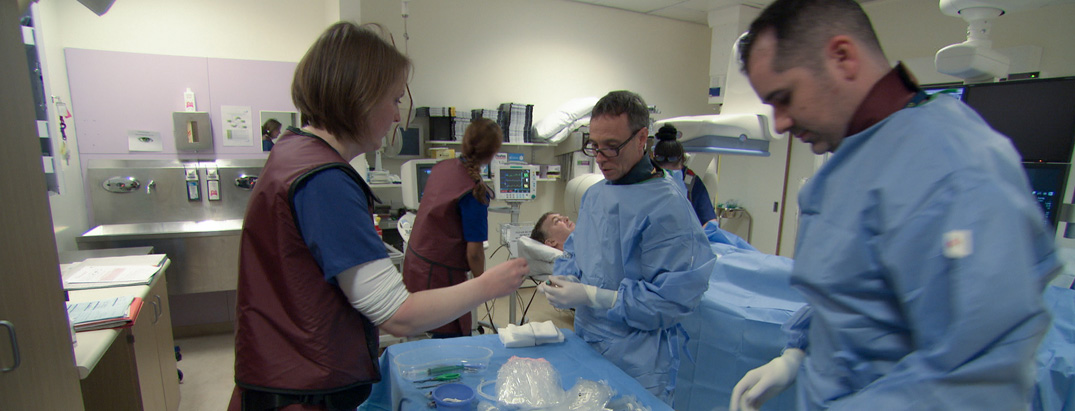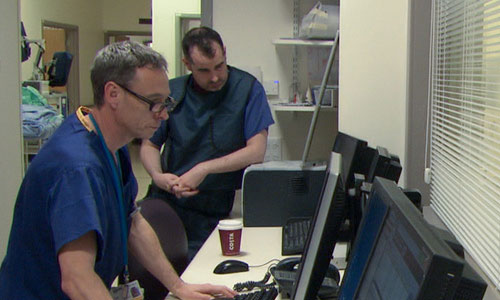
NHS England have announced that from April 2019 selective internal radiation therapy (SIRT) using yttrium-90 microspheres will be available as a routinely commissioned NHS treatment for patients with advanced bowel cancer that has spread to the liver and is not responding to standard chemotherapies.
SIRT was evaluated by NHS England as part of the Commissioning through Evaluation (CtE) scheme from January 2014 to March 2017 and the results were published by NICE and NHS England on the NHS England website in October 2017. The findings were also published online as a full scientific paper in the journal Clinical Oncology by Professor Sharma and his colleagues in September 2018, confirming that the real-world experience of SIRT in the NHS is consistent with the published literature.1
Since 2017, NHS England has been considering the case for routine commissioning of this treatment and they have reached the conclusion that the evidence is sufficient to offer it as a routine treatment for patients with colorectal cancer that has spread to the liver who meet certain criteria.
In the Clinical Commissioning Policy paper: Selective Internal Radiation Therapy (SIRT) for chemotherapy refractory/intolerant metastatic colorectal cancer (adults), NHS England recommends that adults with chemotherapy refractory or chemotherapy intolerant unresectable, liver-only metastatic colorectal cancer that meet all of the eligibility criteria will be able to be treated with SIRT using yttrium-90 microspheres.2
For patients with advanced bowel cancer, patients will have to meet certain criteria to be eligible for the treatment on the NHS. Specialist liver centres in England which satisfy the criteria specified by NHS England will be able to routinely offer this procedure.
The liver metastases should not be operable and the disease should not be responding to standard chemotherapies. For patients with other cancers that may benefit from SIRT, such as primary cancers of the liver, the policy proposals are still being reviewed.
Patients who do not qualify for this treatment by the NHS criteria may be able to receive SIRT by participating in a clinical trial, by submitting Individual Funding Requests via their Oncologist, or pay for it privately. Since the NHS withdrew the treatment in April 2017 in order to evaluate the clinical data, many bowel cancer patients have turned to crowdfunding to fund SIRT privately.
Professor Ricky Sharma, Chair of the SIRT Users Network, said:
"The news today from NHS England is an enormous relief for patients with bowel cancer who meet the criteria and the commissioning decision has taken a painfully long time. We have known since NHS England and NICE published their findings in October 2017 that the real-world experience of SIRT as a treatment of cancer in the NHS is consistent with the published data from other countries."
"My thoughts are with those patients who meet the clinical criteria NHS England have stated as ‘suitable for this treatment,’ but who needed treatment between April 2017 and March 2019 when it was not available on the NHS and who were unable to fund the treatment privately or raise the funds to receive it."
"Unfortunately, patients with advanced bowel cancer that has spread to the liver do not have the luxury of time – they cannot wait for several months for treatments such as SIRT. It is a relief that we can now offer this treatment to NHS patients again, as we were doing from 2012 until 2017, albeit now a limited group of patients who meet NHS England’s current clinical criteria."
Professor Sharma added, "I think there is still scope for improving access to this specialist treatment for patients with a variety of cancers, not just bowel cancer, and across all the nations of the UK, not just England."
References:
1White J, Carolan-Rees G, Dale M, Morgan HE, Patrick HE, See TC, Beeton EL, Swinson DEB, Bell JK, Manas DM, Crellin A, Slevin NJ, Sharma RA. Analysis of a National Programme for Selective Internal Radiation Therapy for Colorectal Cancer Liver Metastases. Clin Oncol (R Coll Radiol). 2018 Oct 5. pii: S0936-6555(18)30438-2. doi: 10.1016/j.clon.2018.09.002.
2Clinical Commissioning Policy: Selective internal radiation therapy (SIRT) for chemotherapy refractory / intolerant metastatic colorectal cancer (adults). NHS England Reference: 170102P - https://www.england.nhs.uk/wp-content/uploads/2018/12/Selective-internal-radiation-therapy-for-chemotherapy-refractory-intolerant-metastatic-colorectal-cancer.pdf. Last accessed 10th January 2019
The NHS England Commissioning through Evaluation (CtE) scheme has now closed and patients are not currently eligible to receive SIRT funded by the NHS. The data that have been collected over the past three years are currently being evaluated by NHS England to make a commissioning decision in late 2017 or early 2018. We will include all details on the website when this decision is made by NHS England. From 1st April 2017, SIRT is no longer available on the NHS for patients meeting the eligibility criteria. Individual Funding Requests can be made by a cancer specialist for patients, but there is no obligation for the NHS to fund such requests. At present, SIRT is not routinely available on the NHS in Wales and Northern Ireland, but may be accessed as part of a clinical trial or by making an application for its use under exceptional circumstances.
The National Institute for Care & Health Excellence reviewed SIRT for use in patients with both liver tumours that have spread from the bowel1 and primary liver cancer2 that cannot be treated by surgery and concluded:
Click here for NICE guidance for SIRT
SIRT is routinely funded by all the major health insurers in the UK. There is also a research study called FOXFIRE that is recruiting patients until 31 October 2014. The study aims to see if treatment with SIR-Spheres microspheres and chemotherapy works better than chemotherapy alone for bowel cancer that has spread to the liver.
After a local anaesthetic is administered to the patient, a SIRT-trained interventional radiologist makes a small incision near the groin. A catheter is then guided through the artery into the liver. The SIR-Spheres microspheres are administered through this catheter. The whole procedure may take around 2-3 hours. After the procedure is completed, patients may be sent to have a scan to check the level of radioactivity of the SIR-Spheres microspheres in the liver. Patients will be monitored for several hours after the procedure. Usually patients who have received SIRT can go home later the same day or the following day and most soon resume their normal daily activities almost immediately.
For more information, there is a designated patient site which can be accessed at:
References:
1. NICE. Guidance IPG401. Last updated May 2013.
2. NICE. Guidance IPG460. July 2013.

There is a restricted access forum for all clinicians involved in the SIRT procedure to help share best practice and experiences. If you have or you would like to share your experiences or you want to find out more about the procedure and the latest clinical developments, please join our community.
Click here to join or sign-in

There is a designated site for SIRT patients, their families and carers called My SIRT Story.
Click here to find out more
